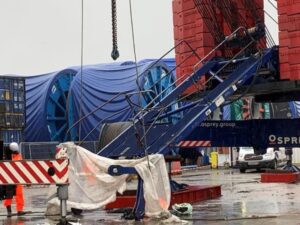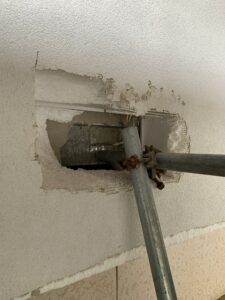Specialist lifting company fined after two workers fell from a crane
A specialist heavy lifting company has been fined after two men fell from height during the assembly of a crane.
On 19 January 2021, two employees of Osprey Heavy Lift Limited fell as a result of a partial collapse of a platform on a crane at the Port of Blyth, Northumberland.
The platform was being installed using four lifting chains, each had a hook and safety clasp. The hooks were looped over metal lugs on the platform in order to lift it into position. The workers removed the two lifting chains nearest the crane structure and moved along the platform to attach the other side to the crane pendants.
At this point, the two remaining lifting chains came off the lugs and one side of the platform fell to the ground.
Despite both men using safety equipment, they both fell from the platform. One operative fell about four metres to the ground below causing serious injuries, including fractures to ribs, right wrist, and eye socket.

An investigation by the Health and Safety Executive (HSE) found that Osprey Heavy Lift Limited failed to properly plan the lift and therefore unsuitable lifting accessories were used. Suitable anchor points for operatives using fall arrest equipment were not identified and there was no consideration of fall distances. Additionally, they failed to provide appropriate instructions and information for work at height and lifting operations.
HSE has guidance on working at height and lifting operations.
At South Tyneside Magistrates’ Court on November 7, Osprey Heavy Lift Ltd of Portishead, Bristol, Somerset pleaded guilty of breaching Section 2(1) of the Health and Safety at Work Act 1974. The company was fined £24,000 and ordered to pay costs of £9,136.
After the hearing, HSE inspector, Clare Maltby said: “Companies who undertake crane assembly work must properly plan lifting activities and work at height, making certain the equipment selected is suitable for the task.
“All organisations undertaking lifting and work at height must ensure work is properly planned, and the correct equipment is selected. Workers should be provided with adequate health and safety information and instructions.”
This HSE prosecution was supported by HSE lawyer Samantha Wells.
Notes to editors:
- The Health and Safety Executive (HSE) is Britain’s national regulator for workplace health and safety. We prevent work-related death, injury and ill health through regulatory actions that range from influencing behaviours across whole industry sectors through to targeted interventions on individual businesses. These activities are supported by globally recognised scientific expertise.
- More information about the legislation referred to in this case is available.
- Further details on the latest HSE news releases is available.



